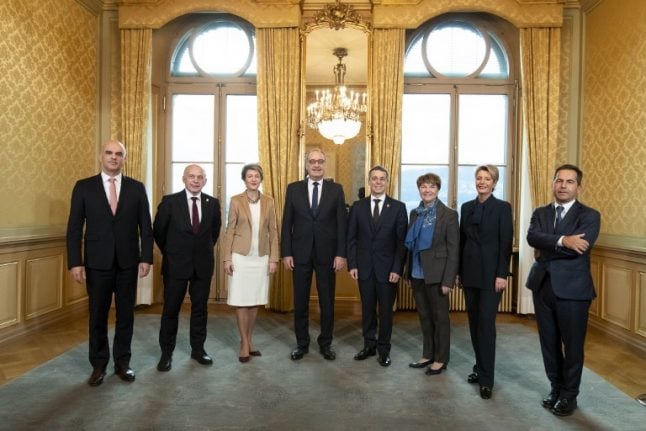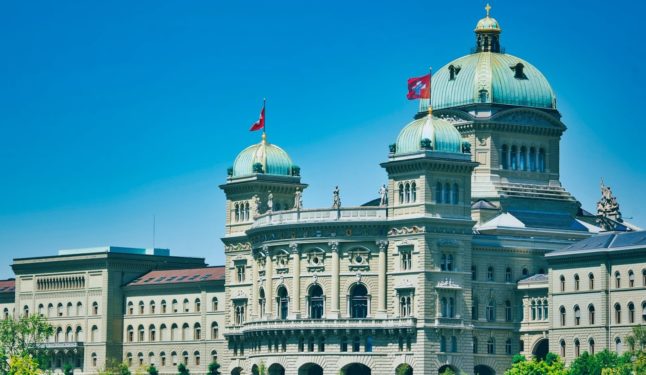Concerns have been raised over the English capabilities of Guy Parmelin, seen fourth from left in the photo above. The politician is a member of Switzerland's seven-member executive known as the Federal Council and he will head up the Department of Economic Affairs, Education and Research (EAER) from next year.
Parmelin's lack of English has been documented in numerous Swiss press articles.
His responsibilities in his new Federal Council position will include conducting negotiations on free trade agreements with Vietnam, India, Malaysia and the USA. These negotiations are widely expected to be carried out in English.
When asked about his English abilities in 2015, Parmelin, from the French-speaking part of Switzerland, initially tried to answer in English but soon reverted to French. “I can English understand but [continuing in French] I prefer to speak French for clarity,” he said.
Curiously, the second line of his biography page on the Swiss Federal Council website says that he holds a “federal baccalaureate” specialising in Latin and English.
A survey conducted by Swiss daily Tages Anzeiger after the 2015 incident revealed that, of 5,739 responders, more than 77 percent believed Parmelin should be able to speak English.
Parmelin has since said that translators are available to him should he feel the need for one, and that his listening comprehension of English was acceptable.
“English is a must”
Tim Guldimann, a high ranking Swiss diplomat, told the 20 Minuten news site that speaking English is a “must” for international politicians. He also suggested that Parmelin’s lack of language skills would be a stumbling block for him. “Personal conversations create a relationship of trust,” he said.
“This is much more difficult to build up with an interpreter.”
Switzerland has four national languages: German, French, Italian and Romansh. Roughly 63 percent of the population is German speaking, and roughly 23 percent are French speaking like Parmelin – who is said to speak “passable” German at best.
Another Swiss politician, Hans Wicki, who failed in his bid to be elected to the Federal Council this month, has also seen his language skills make the news for the wrong reasons.
In October, while speaking to the media about why he wanted to be on the Federal Council, the first question Wicki faced was about his French abilities.
Like Parmelin, Wicki tried initially to answer in French saying “Yes, of course, I speak French but I am not …” before reverting to German to add “a translator like Karin Keller-Sutter”.
Keller-Sutter, who was elected by parliament to join the Federal Council, is fluent in French and a trained translator and interpreter.
Wicki’s second attempt at speaking French shortly afterwards also ended in German and the story featured in numerous newspapers around Switzerland.
However, Georg Lutz, a professor of political science at the University of Lausanne, told 20 Minuten that it is not obligatory for Swiss politicians to be multilingual.
“The Constitution does not state that a member of the Federal Council must speak the national languages,” he said.
“But it would be more difficult if you do not have a passive understanding, as everyone speaks their native language.”
Lutz also said that speaking to the public was much easier with multiple languages but added that politicians can usually find a way around these types of problems.
Is the criticism fair?
It may be surprising to some readers that a lack of languages can trigger such news articles. Not too many British or American politicians are known for their abilities with foreign languages.
British Prime Minister Theresa May did speak French following a meeting with French President Emmanuel Macron in January 2018 – though she read from a prepared statement rather than speaking freely.
More recently, the British government made headlines after being mocked by German speaking EU politicians and diplomats for translating Brexit white papers into “unreadable” German.
US President Donald Trump has also tried his hand at Spanish in the past but his efforts have been pilloried by some media outlets, as you can see below.
Former US president Barack Obama has also admitted to not being fluent in any language other than English but did attempt to speak Spanish on occasion while president.
Perhaps the scrutiny of Parmelin’s English speaking-ability is an indication of Switzerland’s more enthusiastic approach to learning languages.
But then again, according to the 2018 English Proficiency Index, Switzerland is in the second tier of countries when it comes to speaking English as a foreign language.
READ MORE: Why Switzerland still lags behind on English skills
A former wine maker, Parmelin was elected to the Federal Council in 2015, taking over as the head of the Department of Defence, Civil Protection and Sport in 2016.
It is unclear if he is willing to learn English. So far the Department of Defence, Civil Protection and Sport (DDPS) has defended him, saying that his mother-tongue French is an international language of diplomacy and that Parmelin already conducts talks in English.
They admit, however, that in certain situations a translator would be required.



 Please whitelist us to continue reading.
Please whitelist us to continue reading.